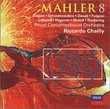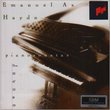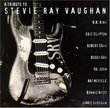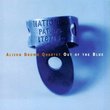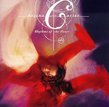| All Artists: Hector Berlioz, Gustav Mahler, David Effron, Eastman Chamber Ensemble, Jan DeGaetani Title: Jan DeGaetani Sings Berlioz, Mahler Members Wishing: 0 Total Copies: 0 Label: Bridge Release Date: 5/10/1993 Genres: Pop, Classical Styles: Vocal Pop, Opera & Classical Vocal Number of Discs: 1 SwapaCD Credits: 1 UPC: 090404901720 |
Search - Hector Berlioz, Gustav Mahler, David Effron :: Jan DeGaetani Sings Berlioz, Mahler
 | Hector Berlioz, Gustav Mahler, David Effron Jan DeGaetani Sings Berlioz, Mahler Genres: Pop, Classical
|
Larger Image |
CD DetailsSimilarly Requested CDs
|
CD ReviewsAn emotional favorite J Scott Morrison | Middlebury VT, USA | 03/01/2003 (5 out of 5 stars) "I've loved these performances since they were first issued in 1989. They are chamber versions of Berlioz's Nuits d'Éte, five songs from Mahler's Des Knaben Wunderhorn and the five Rückert Songs, also by Mahler. The chamber arrangements are by deGaetani's husband, Phil West. They are the last recordings made by deGaetani, who knew she was dying of leukemia. DeGaetani was one of the treasures among American musicians of her era. Universally admired for her musicianship, loved by her students, adored by her many friends, she sang many of the landmark performances of new American music from the 1960s onward. Her recording of George Crumb's 'Ancient Voices of Children' put her on the map internationally. I had the honor of hearing her sing many times in such things as 'Dido and Aeneas' and an Elliot Carter première, 'Syringa.' She never disappointed. The performances here, leaving aside the emotional circumstances of their provenance, are priceless. Her illness had done nothing to dim the lustrous quality of her instantly recognizable mezzo voice nor her impeccable musicianship. West's chamber reductions of the orchestral scores are skillful and effective. I cannot hear that phrase 'Ah! sans amour s'en aller sur la mer,' from 'Sur les lagunes' without a tear coming to my eye. And in my mind's ear it is always deGaetani's voice I hear, even though I have heard Janet Baker and Leontyne Price sing them in concert and have recordings of many other illustrious singers doing it. This is one of my desert isle recordings." As though the Norns pass the chord of life Grady Harp | Los Angeles, CA United States | 05/19/2003 (5 out of 5 stars) "First, my thanks to Bob Zeidler and his review of this extraordinary album for informing me its existence. After his and Scott Morrison's reviews little is left to be said without bordering on redundancy. This album by the inimitable Jan DeGaetani gives only a hint of the vast influence this musician and this being had on the world during her far too short stay here. Her performances always satisfied the harshest critics and the most ardent fans alike. DeGaetani was a musician's musician and in this farewell recording she proved that despite the ravages of leukemia she still had significant things to say, both intellectualy and, most assuredly, compassionately. Her choice to record the Berlioz and Mahler with a chamber ensemble is so very appropriate and intimately conversational. Yes, other times found her voice in richer state, and yes, other singers may 'own' certain of these cycles in the public's ear. But delve into the mystery of her subtle interpretations here and you will be stunned. This is a wonderful memorium to one of America's truly great artists." A priceless treasure. Bob Zeidler | Charlton, MA United States | 04/20/2003 (5 out of 5 stars) "I need to thank Scott Morrison, the first reviewer of this album, for bringing attention of its existence to me in the first place. Self-confessed Mahlerite that I am, I'm hard-pressed to account for ever having missed this release in the first place. After the fact, with the album safely in my possession, I tried to track down how this oversight might have happened, even to the extent of tearing through my back issues of Fanfare magazine to see if I had somehow missed a review, or at least a release message. (I couldn't find one.) But all's well that ends well.
Jan DeGaetani was one of those rare American singers who felt totally at home with contemporary music. Like Phyllis Curtin before her, and, seemingly, Susan Narucki after her, she gained much of her well-deserved reputation in this field, singing the music of Ives, Crumb, Rochberg, Kurtag, Copland and Carter, just to name a few. Her album of Ives songs, with Gilbert Kalish (a frequent partner) at the piano is a well-deserved classic. But, if her repertoire happened to end (chronologically speaking) with Crumb, Kurtag and Rochberg, her range was exceedingly wide, extending back to Dowland, and she was equally famed as a Bach specialist. The provenance of this release, as pointed out by Scott Morrison, is remarkable. It was Ms. DeGaetani's final album, recorded while she was suffering from the final stages of leukemia but fortunately with sufficient temporary remission from the illness that it hardly affected her vocal prowess. (The album was recorded in sessions during May, 1989; she succumbed to the illness four months later.) It is equally special that the works on this album were the outcome of a collaborative effort between Ms. DeGaetani and her husband, Phil West (of the Eastman School of Music), who arranged chamber orchestra settings of these three famous song cycles specifically for her. When one further includes the fact that Mr. West, an oboist of no mean accomplishment, performs the all-important oboe d'amore solo in Mahler's "Im Mitternacht" and English horn solo in his "Ich bin der Welt abhanden gekommen," the emotional outpouring is palpable. In this year of the Berlioz bicentennial, it had been in my plans to review at least two other famous recordings of his "Les nuits d'été" (by Dame Janet Baker and Véronique Gens). But - again, given this recording's provenance - I thought it most fitting to begin with Ms. DeGaetani's version. The songs in the cycle suffer not a whit from the chamber orchestra arrangements. (In point of fact, Berlioz originally wrote these for mezzo and piano, and only later transcribed them for full orchestra.) With her idiomatic French and remarkably fresh voice considering the circumstances, Ms. DeGaetani's performance of these "songs of yearning" needs no apologies, least of all from the likes of me. The five songs selected from Mahler's "Des Knaben Wunderhorn," as the name of the cycle, and when in his life Mahler composed them, suggest, are "youthful" songs. Again, the freshness of Ms. DeGaetani's voice belies her physical condition at the time. Mr. West's arrangements, moreover, are totally idiomatic; as if Mahler himself had rescored the orchestral parts. As good as these two song-cycles are, Mahler's five "Rückert-Lieder" occupy a very special place in this Mahlerite's heart. Chronologically, they occupy a period in Mahler's life when he was inadvertently at death's door (but nevertheless lived another decade), the result of which was a dramatic change in his compositional aesthetic, from the freshness and naivety of "early" Mahler to the inward-looking style of "late" Mahler (particularly his "Das Lied von der Erde" and the Ninth and unfinished Tenth Symphonies). In particular, "Ich bin der Welt abhanden gekommen" ("I have taken leave of the world") and the contemporaneous Adagietto of his Fifth Symphony foreshadow, more clearly than any other works of his, what the aesthetic of these "late" works was to be. The Rückert cycle, already much more a "chamber" work in Mahler's hands than his earlier cycles, suffers not a whit from these scaled-down (basically, one instrument per part) settings of Mr. West. And, when - on the only occasion in the cycle as written by Mahler - the mezzo is called upon to bring forth a voice of some declamatory power (the final bars of "Im Mitternacht"), Ms. Degaetani rises to the occasion perfectly: at a "forte" level but not overriding the orchestra, just as Mahler had written it. There was of course only one "perfect" way to end this valedictory album, with the final song of the Rückert cycle. One could write reams of material on the significance of "Ich bin der Welt abhanden gekommen" to an understanding of Mahler's style and sources of inspiration at different stages in his life (in fact, reams of material HAVE been written to that end). Far better, though, to simply listen to the marvelous interplay of Ms. DeGaetani's voice and Mr. West's English horn, and let oneself be reduced to jelly. If you, like me, have an emotional connection with these songs and a fond recollection of Jan DeGaetani as one of America's finest singers, the tears will begin to flow very early into this album, and, by the last note of "Ich bin der Welt abhanden gekommen," you'll be little more than a puddle on the floor. In retrospect, I guess we should be thankful that the middle song-cycle on this album turned out to be the "Wunderhorn" songs, and not Mahler's "Kindertotenlieder" setting of other of Rückert's ineffably moving poetry. It might have been too much for merely mortal fans of Ms. DeGaetani's artistry to handle. As Scott Morrison wrote, truly a desert island recording. Bob Zeidler" |

 Track Listings (16) - Disc #1
Track Listings (16) - Disc #1